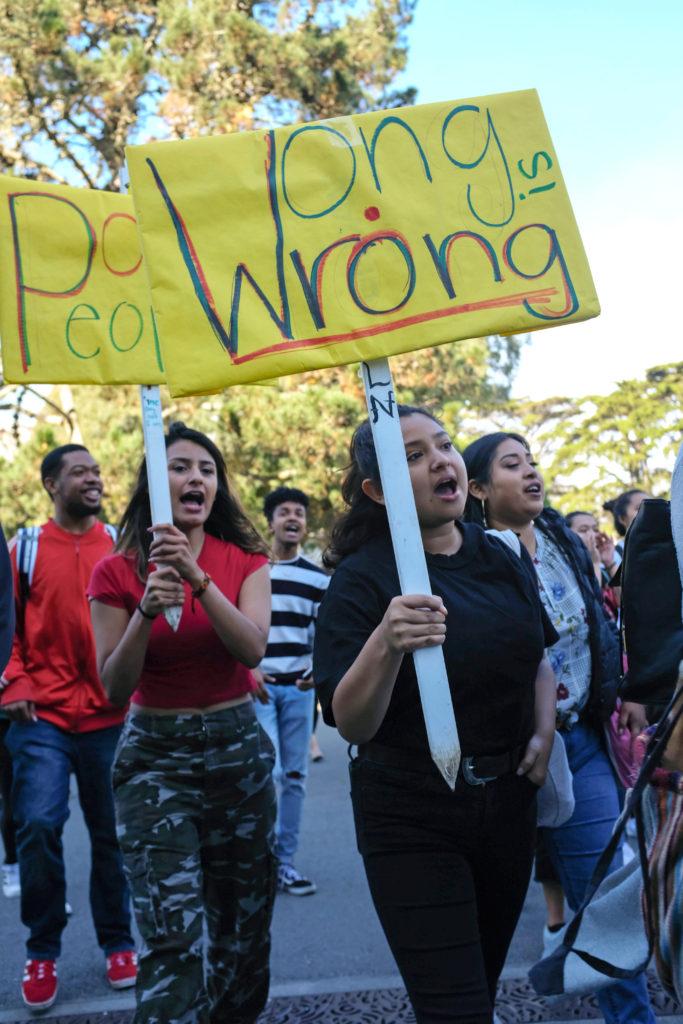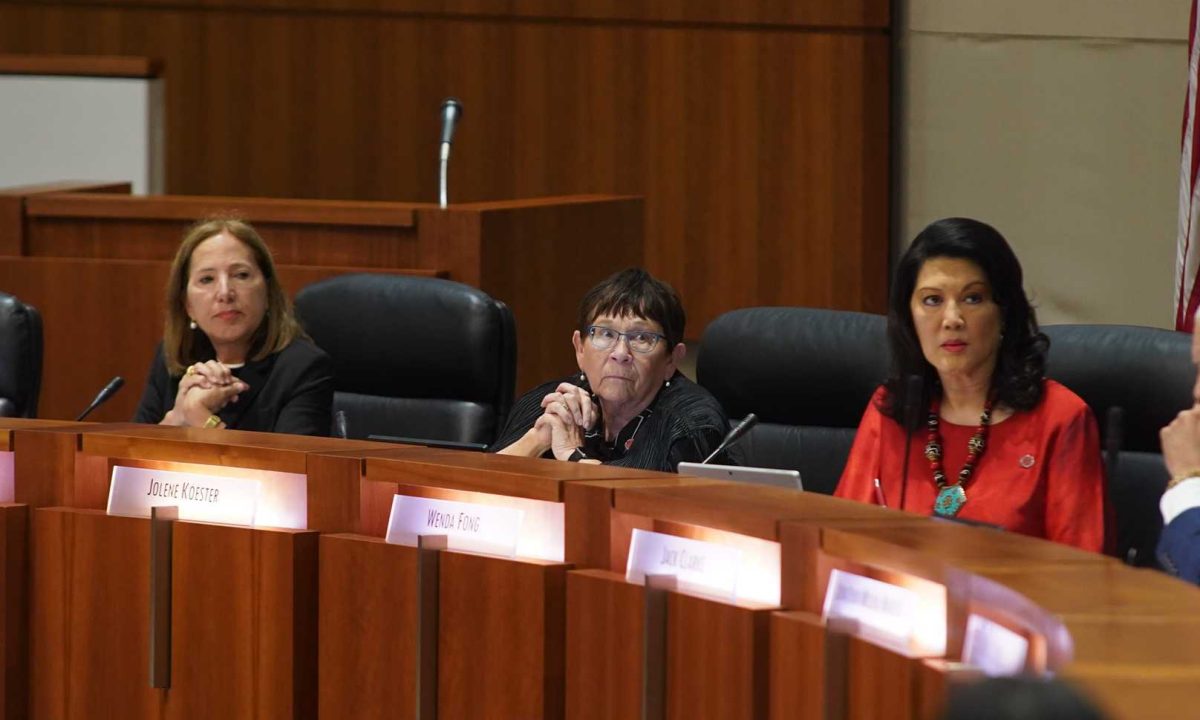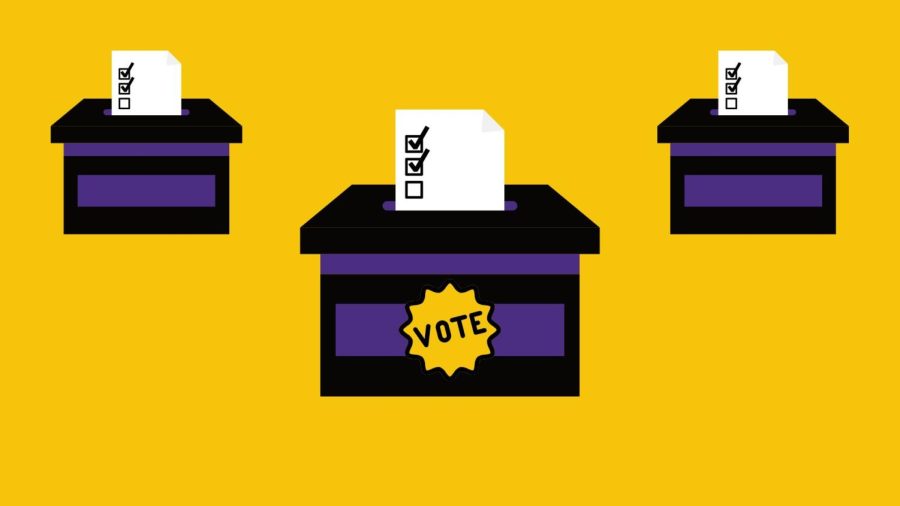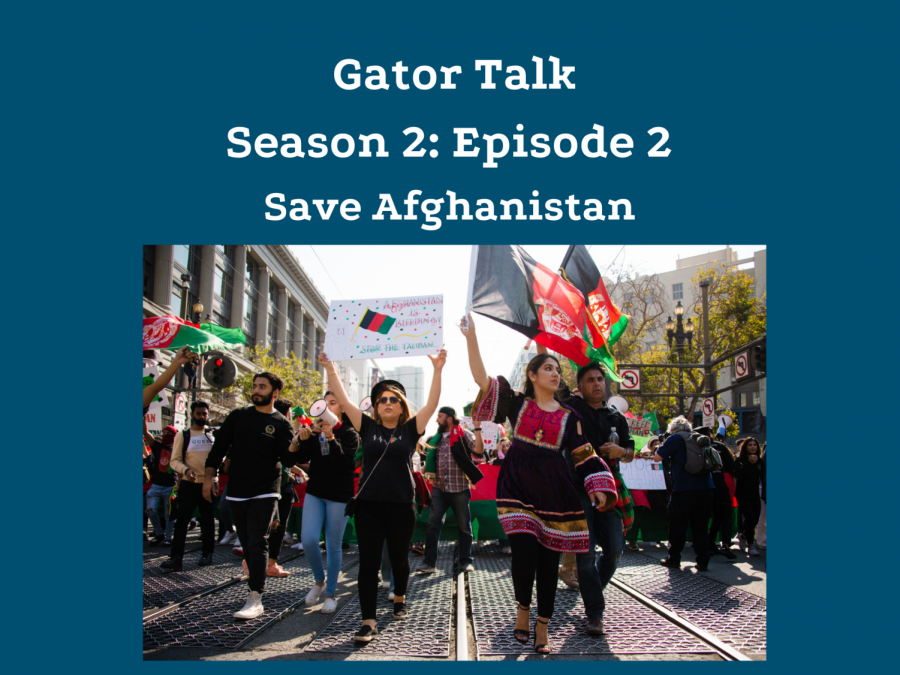A crowd of about 50 protesting students crammed into a narrow hall of the fifth floor of the administration building while stomping, singing, chanting, banging on walls and plastering a list of 16 demands on President Leslie Wong’s door on Thursday, Nov. 8.
The action was intended to commemorate the largest student strike in U.S. history, which began on SF State’s campus 50 years ago this month.
Black Student Union coordinator Damion Square led the students from Malcolm X Plaza. They led various chants such as “On strike, shut it down!” and “The people, united, will never be divided!” while marching up the administration building stairs.
The students’ top demands were free housing, free food, paid transportation and more counselors.
“I left home because I wasn’t accepted for who I am,” said Ayla Karaca, an SF State student who is housing insecure. “To be a student at SF State, to fight to stay here, it’s literally impossible with no housing. I am couchsurfing just to get my education.”
According to LeAna Hudson, BSU public affairs coordinator, the demands were agreed upon by various student organizations during a meeting on the previous day.
“It was a collective list that was created by all of us so we could all be represented correctly and accordingly,” Hudson said.
Interim Associate Dean for Student Life Brian Stuart and Chief of Police for SF State University Police Jason Wu arrived on the scene shortly after protesters arrived in front of Wong’s office.
Students responded by chanting “We want Wong!” displeased that he was not present to hear their demands.
Stuart declined to comment.
Students held the floor for four hours.
“There are so many students who are homeless, there are so many students who feel scared every single day in this school and this city alone,“ said communications student Alberto Moreno Garcia, 24. “Administration has done a horrible job of taking classes away from us every single day.”
From Nov. 6, 1968, to March 21, 1969, students from the Black Student Union and the Third World Liberation Front led the longest student strike in America against a Eurocentric education that they believed didn’t represent them.
The end of that strike led to the establishment of the College of Ethnic Studies.
Some came to the demonstrations to show their support for and awareness of the significance of ethnic studies.
“It [Asian American Studies] is a program I deeply cherish because it’s something that’s unique to our school,” said Dylan Nishi, a pre-nursing major. “I’m participating because it shows that I have a strong root in this school, such as social activism and progressive change for my fellow students.”
Ethnic studies student Roglio Mota said he wants to see a new ethnic studies building separate from the Psychology Department as well as upper division general education classes in the Ethnic Studies Department.
He said he hopes that whoever replaces Wong will be transparent and responsive to the concerns of students.
Others represented themselves as students who were dissatisfied with what they perceive as class shortages and a lack of diversity among faculty.
The standoff ended when Luoluo Hong, vice president of Student Affairs and Student Management, used a bullhorn to negotiate a temporary resolution to hear out the students in the future.
Hong responded to the action at 2:30 p.m. alongside Jason Porth, the vice president of University Enterprises. Hudson fielded questions from the crowd in an impromptu open forum with Hong.
Some of the most prominent issues were cost-related, with Square asking Hong what she’s doing to protect marginalized students from gentrification.
Hong mentioned the campus survey, which the students didn’t appreciate.
“I think the students made a collective sigh because we’re aware that these campus surveys happen on a pretty regular basis,” Square told Hong. “In the past, the surveys you guys have done have given the same results in terms of the situation that marginalized students are on campus consistently.”
Yuriko Castillian, a criminal justice major, told Hong that she was separated from her mother due to gentrification.
“I wanted to bring it up to the president [Leslie Wong], and his lack of interest in student interests is messed up,” Castillian said. ”I just wanted to express my pain and convey enough emotion to show how affected I am as a San Francisco native. I don’t even have it the worst.”
The demonstrators ended the strike at 4:05 p.m. when Hong signed a resolution to address the protesters’ claims.
Castilian said Hong’s resolution left her feeling dissatisfied. Square said further action is planned for next week.
“Right now, it’s more important than ever that we don’t let up off their helmet. As you see, they don’t take us seriously,” Square said. “They’ll only take us seriously when they see that we’re serious. The only way we’re going to be serious is if we don’t stay off their heads about our demands.”











Aaron Goodman • Nov 9, 2018 at 6:30 pm
Good students are waking up about the U.Corp and SFSU Masterplan which is heard Dec5th at the trustees. Email the EIR for 2035 planning and demand buildings that support students needs not just the $ of overdevelopment and expansion. Keep the UPS blocks and UPN as existing rent controlled housing make em sell it back to the SFCLT or a land trust with stabilized rents vs market rents and flipping by housing profiteers in the planning wing…. J.Porth needs to go back to his prior boundaries in planning and reduce the sprawl of campus affecting the prior backbone of Westside housing in Stonestown apartments and Parkmerced… Demand transit connection and build out inside the prior 2003 boundaries!!!
Or you will end up with all pay to play mashouf centers across the campus…